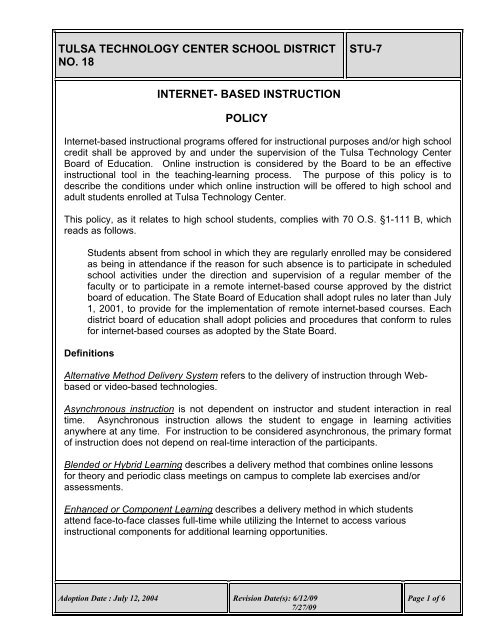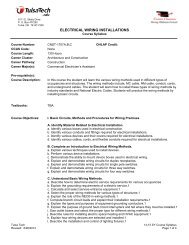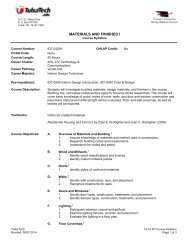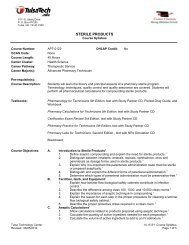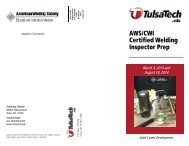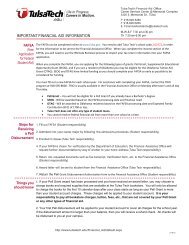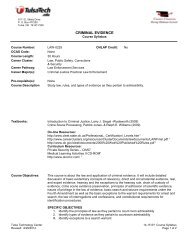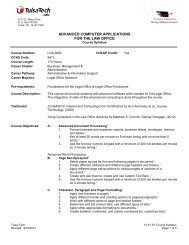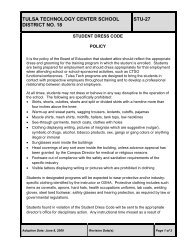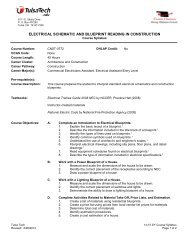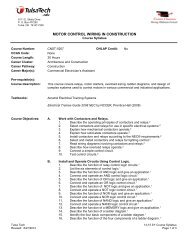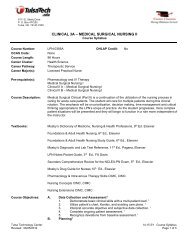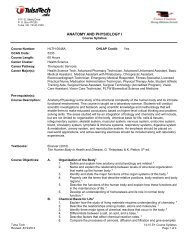STU-07 Internet-Based Instruction - Tulsa Technology Center
STU-07 Internet-Based Instruction - Tulsa Technology Center
STU-07 Internet-Based Instruction - Tulsa Technology Center
- No tags were found...
You also want an ePaper? Increase the reach of your titles
YUMPU automatically turns print PDFs into web optimized ePapers that Google loves.
TULSA TECHNOLOGY CENTER SCHOOL DISTRICTNO. 18<strong>STU</strong>-7INTERNET- BASED INSTRUCTIONPOLICY<strong>Internet</strong>-based instructional programs offered for instructional purposes and/or high schoolcredit shall be approved by and under the supervision of the <strong>Tulsa</strong> <strong>Technology</strong> <strong>Center</strong>Board of Education. Online instruction is considered by the Board to be an effectiveinstructional tool in the teaching-learning process. The purpose of this policy is todescribe the conditions under which online instruction will be offered to high school andadult students enrolled at <strong>Tulsa</strong> <strong>Technology</strong> <strong>Center</strong>.This policy, as it relates to high school students, complies with 70 O.S. §1-111 B, whichreads as follows.Students absent from school in which they are regularly enrolled may be consideredas being in attendance if the reason for such absence is to participate in scheduledschool activities under the direction and supervision of a regular member of thefaculty or to participate in a remote internet-based course approved by the districtboard of education. The State Board of Education shall adopt rules no later than July1, 2001, to provide for the implementation of remote internet-based courses. Eachdistrict board of education shall adopt policies and procedures that conform to rulesfor internet-based courses as adopted by the State Board.DefinitionsAlternative Method Delivery System refers to the delivery of instruction through Webbasedor video-based technologies.Asynchronous instruction is not dependent on instructor and student interaction in realtime. Asynchronous instruction allows the student to engage in learning activitiesanywhere at any time. For instruction to be considered asynchronous, the primary formatof instruction does not depend on real-time interaction of the participants.Blended or Hybrid Learning describes a delivery method that combines online lessonsfor theory and periodic class meetings on campus to complete lab exercises and/orassessments.Enhanced or Component Learning describes a delivery method in which studentsattend face-to-face classes full-time while utilizing the <strong>Internet</strong> to access variousinstructional components for additional learning opportunities.Adoption Date : July 12, 2004 Revision Date(s): 6/12/097/27/09Page 1 of 6
TULSA TECHNOLOGY CENTER SCHOOL DISTRICTNO. 18<strong>STU</strong>-7Netiquette consists of the rules and guidelines for acceptable behavior in electroniccommunication.Online Course describes a delivery method in which students complete the entirecourse online with possibly one or two required visits to the campus.Synchronous instruction occurs when the instructor and student’s primary interactions arein real-time. Regular classroom instruction is synchronous instruction, as well as twowayinteractive video. Web-based instruction that requires real-time interaction betweenstudent(s) and instructor as the primary format of instruction is also synchronousinstruction.Two-way interactive video instruction provides for real-time (synchronous) interactionbetween student(s) and instructor by means of an electronic medium that provides forboth audio (sound) and video (sight) signal. Students and instructor participating in twowayinteractive video instruction may both see and hear each other in an approximation ofreal-time.Web-based instruction uses the World Wide Web as the primary medium ofinstruction, with a computer serving as the primary tool of instruction.General Guidelines for <strong>Internet</strong>-<strong>Based</strong> <strong>Instruction</strong> Receiving High School Credit at<strong>Tulsa</strong> <strong>Technology</strong> <strong>Center</strong>Certified <strong>Tulsa</strong> <strong>Technology</strong> <strong>Center</strong> instructors who have been trained to deliver qualityonline instruction shall supervise <strong>Internet</strong>-based programs. The credit earned by studentsshall be placed on the student’s home high school transcript upon completion of thecourse.Prior to offering an <strong>Internet</strong>-based instructional course, the Board of Education shallcomply with the following guidelines recommended by the State Department of Education:1. The boards of education from participating sending schools shall, through mutualagreement, grant students credit for completion of courses offered by means of<strong>Internet</strong>-based instruction and assume responsibility for such coursework.2. Only high school students who are regularly enrolled in this district shall be allowedto enroll in alternative instructional delivery systems courses offered for creditthrough this district.3. A district board of education may authorize enrollment on a part-time basis utilizing<strong>Internet</strong>-based courses for students who have dropped out of school or have beenAdoption Date : July 12, 2004 Revision Date(s): 6/12/097/27/09Page 2 of 6
TULSA TECHNOLOGY CENTER SCHOOL DISTRICTNO. 18<strong>STU</strong>-7suspended from school provided such student was enrolled at any time in a publicschool in this state during the previous three (3) school years.4. The campus director or designee shall evaluate and approve/disapprove allstudents’ requests to participate in courses delivered by means of <strong>Internet</strong>-basedinstruction. Only those approved enrollments shall be eligible to receive credit.5. Students earning credit by means of <strong>Internet</strong>-based instruction shall participate in allassessments required by the Oklahoma School Testing Program. No student shallbe allowed to participate in these assessments at a place other than the school siteat which the student is enrolled.6. Courses offered for academic credit by means of <strong>Internet</strong>-based instruction shall bealigned with the Priority Academic Student Skills (PASS).7. Oklahoma statutes limiting the number of students teachers may supervise in eachperiod of instruction and the total number of students allowed daily shall apply tosynchronous web-based and two-way interactive video courses. The number ofstudents each instructor may be required to supervise in asynchronous web-basedcourses shall be no more than twenty (20).8. Prior to the beginning of instruction, cooperating school districts sharing courses bymeans of two-way interactive video technology shall, by means of contractualagreement, address issues including but not limited to: instruction costs, bellschedules, school calendars, student behavior, teacher evaluation, textbooks, classperiods, student grades and grading policies, teacher load, and instructoremployment.9. Contractual agreements shall be established between the school district andparent(s), or legal guardian, of students participating in alternative instructionaldelivery system courses prior to the beginning of instruction. These contracts mayaddress such issues as grading criteria, time allotted for course completion, studentattendance, and the responsibility for course costs and equipment, as well as otherissues selected by <strong>Tulsa</strong> <strong>Technology</strong> <strong>Center</strong>10. Instructors of <strong>Internet</strong>-based courses shall be: (a) certified in Oklahoma or anotherstate to teach in the content area of the course offered, or (b) a faculty member atan accredited insitution of higher education, possessing the specific contentexpertise necessary to teach the course.11. Annually, the board of education shall establish fees or charges for the provision ofalternative instructional delivery system courses. The district shall not be liable forAdoption Date : July 12, 2004 Revision Date(s): 6/12/097/27/09Page 3 of 6
TULSA TECHNOLOGY CENTER SCHOOL DISTRICTNO. 18<strong>STU</strong>-7payment of any fees or charges for any <strong>Internet</strong>-based course for a student who hasnot fully complied with district policies and procedures.12. All student enrollment requests for <strong>Internet</strong>-based courses shall be evaluated andapproved/disapproved by the home school principal and counselor, the principalfrom the high school providing the instructor, (if the course is taught as a part of theinstructors regular contract) the student, and his/her parent(s)/guardian(s) mustagree to the conditions listed in this policy in order to be enrolled in <strong>Internet</strong>-basedcourses.<strong>Tulsa</strong> <strong>Technology</strong> <strong>Center</strong> Responsibility for All <strong>Internet</strong>-<strong>Based</strong> <strong>Instruction</strong>Technical Support for <strong>Internet</strong>-<strong>Based</strong> <strong>Instruction</strong>1. The District will provide the online learning management system required for thedelivery of a quality online learning experience for all students.2. Computers and software required to complete an online course will be available toenrolled students at approved locations within the District.3. Each teacher for two-way interactive video and web-based courses shall beprovided in-service training pertaining to the methodology of instructional deliveryand the technical aspects of distance learning.4. The District will provide the administration, instructors, and students with thetechnical support required to access and operate the online tools necessary forquality online instruction during normal business hours.a. <strong>Tulsa</strong> <strong>Technology</strong> <strong>Center</strong> will provide technical support for the LearningManagement System.b. <strong>Tulsa</strong> <strong>Technology</strong> <strong>Center</strong> online instructors are not responsible for a student’sbasic computer literacy skills. A basic skills self-assessment will be available onthe District’s public website.Standards for <strong>Internet</strong>-<strong>Based</strong> <strong>Instruction</strong>5. Web-based and two-way interactive video instruction shall be viewed as methods bywhich the school district can expand the course offerings and access to instructionalresources. These technologies should not be viewed solely as substitutes for direct,face-to-face student and teacher interactions, but as a means of expanding theability of the district to bring the world of knowledge to the students.6. The <strong>Instruction</strong>al Services Department, in conjunction with the appropriate Dean of<strong>Instruction</strong>, must approve all online courses offered for credit by the District.Adoption Date : July 12, 2004 Revision Date(s): 6/12/097/27/09Page 4 of 6
TULSA TECHNOLOGY CENTER SCHOOL DISTRICTNO. 18<strong>STU</strong>-77. Online <strong>Instruction</strong>al standards have been adopted District-wide which ensure that thecourse design, content, and presentation reflect the highest quality of instruction.8. The District will ensure that the learning outcomes of the programs, courses andcertificates offered by means of online instruction are comparable to the outcomesand rigor offered in face-to-face courses on campus.9. Online courses will be evaluated to ensure that they adhere to the online standards,which have been adopted by the District.10. The District will provide the administration and instructors with the instructionalsupport required for blending the online tools with curriculum in a manner necessaryto provide quality online instruction.11. Student progress shall be monitored on a weekly basis by the instructor.Assignments shall be graded by the instructor on a weekly basis. A syllabus shallbe prepared by the teacher and posted on the school district’s web-site prior to thecommencement of the first class. The syllabus shall provide details to studentsincluding assignment due dates, grading, testing, and the grading scale used.12. The District will provide the students with an anonymous end-of-instruction surveywhich will be evaluated to determine necessary modifications to the online course ormethod of delivery.13. Online materials offered by <strong>Tulsa</strong> <strong>Technology</strong> <strong>Center</strong> comply with Section 508 of theRehabilitation Act. Individuals with disabilities who are requesting a reasonableaccommodation/modification must provide written notification and documentation asoutlined in Section 2.0 of the Nondiscrimination Policy, Policy No. GEN-01.14. All federal and state statutes pertaining to student privacy, the posting of images onthe World Wide Web, copyright of materials, Federal Communications Commissionrules pertaining to the public broadcasting of audio and video, and other such issuesshall be adhered to by the district. (See the Acceptable Use of Information Systemsand Educational <strong>Technology</strong> Resources policy, Policy No. GEN-17; PER-31; <strong>STU</strong>-20.)Adminstration of <strong>Internet</strong>-<strong>Based</strong> <strong>Instruction</strong>15. The campus director shall appoint a certified staff member to serve as the buildinglevel contact person to assist students enrolling in on-line courses and to serve as aliaison to the on-line teachers and provider (s).Adoption Date : July 12, 2004 Revision Date(s): 6/12/097/27/09Page 5 of 6
TULSA TECHNOLOGY CENTER SCHOOL DISTRICTNO. 18<strong>STU</strong>-7Data Management16. The security of individual student data and records shall be maintained and receivethe same protection afforded students under state and federal laws. No individualstudent data obtained through participation in <strong>Internet</strong>-based instruction coursesshall be used for any purposes other than those that support the instruction of theindividual student.17. District level aggregated data obtained through participation in <strong>Internet</strong>-basedinstruction courses shall be utilized for education purposes only and shall not beprovided to commercial entities.Student Responsibility for <strong>Internet</strong>-<strong>Based</strong> <strong>Instruction</strong>Expectations of Students1. Students are aware of the expectations, netiquette, skills, and technology required toparticipate in an online course. This information will be available on the District’spublic website.2. Students will abide by all applicable behaviors as outlined in the Behavioral Code forSecondary and Adult Students in the Student Handbook, including but not limited toharassment and/or intimidation, obscene language and/or vulgarity, plagiarism, andcheating . (See the Student Behavior and Discipline policy, Policy No. <strong>STU</strong>-18 andPrevention of School Bullying, Policy No. <strong>STU</strong>-22.)3. Students will abide by all federal and state statutes pertaining to the use ofcopyrighted materials.4. By enrolling in an online course, students are declaring that they have the minimumcomputer skills to participate in an online course, including but not limited to <strong>Internet</strong>,file management, and e-mail skills. A basic skills self-assessment will be availableon the District’s public website.5. Students participating in online instruction will abide by the <strong>Tulsa</strong> <strong>Technology</strong> <strong>Center</strong>Acceptable Use of Information Systems and Educational <strong>Technology</strong> Resourcespolicy, Policy No. GEN-17; PER-31; <strong>STU</strong>-20.6. Students at remote sites who participate in the <strong>Internet</strong>-based courses offered by thedistrict shall be responsible for providing their own equipment and <strong>Internet</strong> access.7. Tuition, books, supplies, and any applicable fees required for online courses taughtthrough the district shall be the responsibility of the student.Adoption Date : July 12, 2004 Revision Date(s): 6/12/097/27/09Page 6 of 6


